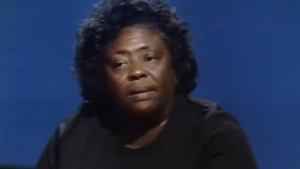Early Life and Childhood Struggles
Fannie Lou Hamer, born on October 6, 1917, in Montgomery County, Mississippi, was the youngest of 20 children to Lou Ella and James Townsend. Her family worked as sharecroppers, and despite suffering from polio at age five, Hamer joined them in the fields at the age of six. At just eight years old, she witnessed the lynching of a local sharecropper, Joe Pullam, a moment that haunted her throughout her life.
Poverty forced Hamer to drop out of school at 12, and by age 13, she was picking up to 400 pounds of cotton per day, earning a meager $1. Her brief education allowed her to read and write, leading her to work as a record keeper on the plantation. It was during this time that Hamer discovered how plantation owners cheated workers out of fair wages, prompting her to secretly tilt the scales in favor of the sharecroppers.

Forced Sterilization and the Fight for Voting Rights
In 1961, Hamer underwent surgery to remove a small cyst, but without her consent, she was also given a hysterectomy. This practice, common in Mississippi at the time, was referred to as a “Mississippi appendectomy,” a term coined by Hamer herself. Hamer testified in 1964 about the forced sterilizations of Black women, revealing that many women in her community had been sterilized without their knowledge or consent.
On August 31, 1962, Hamer took a bold step by attempting to register to vote in Indianola, Mississippi, despite the racial barriers in place. Only she and one other person were allowed to take the literacy test, which was deliberately designed to prevent Black citizens from voting. After failing the test, she returned home, only to be told by the plantation owner where she worked to withdraw her registration attempt or leave. Hamer refused and was immediately thrown off the plantation.
Despite facing threats to her life, including a near-death encounter when attackers fired shots into the house where they believed she was staying, Hamer persisted. In January 1963, she finally passed the literacy test, but her challenges didn’t end there. She was denied the right to vote because she lacked poll-tax receipts, another barrier put in place to suppress Black voters. The 24th Amendment, which outlawed poll taxes, wasn’t fully enforced until 1965, leaving Hamer and others disenfranchised for years.
Brutality in Winona, Mississippi
Hamer’s dedication to civil rights led her to attend a voter registration and civic education training session in Charleston, South Carolina, in 1963. On the way home, she and her fellow activists were arrested in Winona, Mississippi, after trying to integrate lunch counters. Hamer was severely beaten while in jail, suffering lifelong damage to her kidneys, eyes, and legs. The police also forced Black prisoners to beat the activists. Despite the brutality, the police were cleared of any wrongdoing during a subsequent trial.
Political Activism and the Mississippi Freedom Democratic Party
Undeterred by the violence, Hamer co-founded the Mississippi Freedom Democratic Party (MFDP) after failing to make progress with the pro-segregation Mississippi Democratic Party. In 1964, she attended the Democratic National Convention to demand representation. Her testimony, in which she fearlessly stated her full name and address, garnered national attention, especially after President Lyndon Johnson unsuccessfully tried to interrupt her speech by calling a live press conference. Despite death threats and immense political pressure, Hamer continued her fight. However, the MFDP’s efforts were undermined when the Democratic Party offered a hollow compromise: two delegates with no real voting power, and none of those seats were offered to Hamer.
Running for Office and the Freedom Farm Cooperative
In 1964, Hamer made her first bid for Congress, and while unsuccessful, she continued to push for change, running again in 1967 and 1971. Her 1967 candidacy was disqualified on a technicality, and she lost to the incumbent in 1971. However, Hamer had a significant victory in 1968 when the Democratic Party began requiring equal representation for state delegations. She was finally recognized as an official delegate for Mississippi at the National Democratic Party Convention and used her platform to protest the Vietnam War.
Shifting her focus toward economic justice, Hamer founded the Freedom Farm Cooperative in 1969, acquiring land for Black families to farm collectively. With support from donors like Harry Belafonte, the co-op grew to 680 acres and helped impoverished families through programs like the “pig bank,” which distributed pigs to Black families in need. Despite its success, the co-op struggled without institutional support and eventually dissolved.
Legacy and Final Years
Hamer’s relentless work for voting rights culminated in her 1965 civil rights case, Hamer v. Campbell, which contributed to the passage of the Voting Rights Act. In 1970, she organized a class-action lawsuit for school desegregation in Sunflower County, Mississippi, resulting in the integration of the public school system.
In 1976, Hamer was diagnosed with breast cancer and underwent a radical mastectomy. Despite her declining health, she continued her civil rights work until her death on March 14, 1977, at the age of 59. Hamer was buried at the Freedom Farm Cooperative, and her gravestone bears her famous motto: “We are sick and tired of being sick and tired.”


